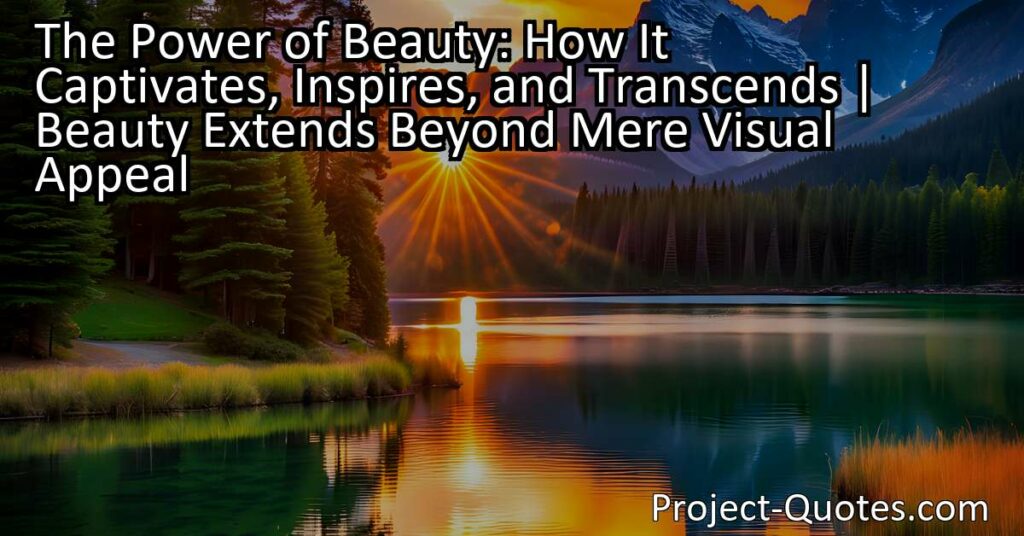Beauty is nature’s brag, and must be shown in courts, at feasts, and high solemnities, where most may wonder at the workmanship.
John Milton
In “The Power of Beauty: How It Captivates, Inspires, and Transcends,” we explore the idea that beauty extends beyond mere visual appeal. Beauty is nature’s way of showcasing its finest creations, evoking emotions, bringing people together, and shaping societies. From breathtaking landscapes to acts of kindness, beauty is a gift that reminds us of the wonders in the world.
Table of Contents
- 1 Beauty is nature’s brag, and must be shown in courts, at feasts, and high solemnities, where most may wonder at the workmanship.
- 2 John Milton
- 3 Meaning of Quote – Beauty is nature’s brag, and must be shown in courts, at feasts, and high solemnities, where most may wonder at the workmanship.
- 4 Freely Shareable Quote Image
- 5 Related
Meaning of Quote – Beauty is nature’s brag, and must be shown in courts, at feasts, and high solemnities, where most may wonder at the workmanship.
Beauty is a fascinating concept that has captured the attention of humans for centuries. From magnificent landscapes to stunning artworks to exquisite individuals, beauty is truly nature’s boast. In the words of John Milton, “Beauty is nature’s brag, and must be shown in courts, at feasts, and high solemnities, where most may wonder at the workmanship.” These words eloquently convey the idea that beauty is meant to be displayed and admired, particularly in grand and celebratory settings. In this essay, we will delve deeper into this quote and explore the various ways in which beauty is showcased, its impact on individuals and societies, and the significance of beauty in our lives.
To begin with, let us consider the notion of beauty being nature’s “brag.” In essence, this suggests that beauty is a means through which nature shows off its finest creations. Just like a proud parent displaying their child’s accomplishments, nature exhibits its most breathtaking phenomena for all to see. Whether it be a picturesque sunset, a flourishing garden, or a remarkable creature, nature’s innate beauty is intended to captivate and inspire awe.
Moreover, Milton emphasizes that beauty must be showcased in “courts, at feasts, and high solemnities.” These grand occasions are ideal settings for the manifestation of beauty, as they gather people from diverse backgrounds to appreciate the wonders of nature. Courts, historically associated with royalty and nobility, represent the epitome of opulence and elegance. Feasts and high solemnities, on the other hand, offer communal celebrations where individuals come together to revel in the splendors of life. Beauty, in this context, serves as a unifying force that transcends social barriers and allows individuals to find common ground in their shared admiration for nature’s grandeur.
One cannot deny that the presence of beauty has a profound impact on individuals. When faced with something exquisitely beautiful, human beings often experience a range of emotions, such as joy, wonder, and even a sense of transcendence. In fact, studies have shown that exposure to beauty can have a positive effect on one’s well-being and overall happiness. Whether it is a breathtaking landscape, a melodious piece of music, or a captivating piece of art, beauty has the power to uplift spirits and bring solace to troubled souls.
Furthermore, the appreciation of beauty extends beyond mere visual appeal. It stimulates our senses, ignites our imagination, and cultivates our ability to find meaning in the world around us. When we encounter a beautiful work of literature, for instance, it transports us to different worlds, introduces us to fascinating characters, and invokes a range of emotions. In this way, beauty in literature serves as a gateway to a realm where our minds can roam freely and explore the depths of human experiences.
Not only does beauty have a profound impact on individuals, but it also plays a significant role in shaping societies. Throughout history, various civilizations and cultures have celebrated beauty through their art, architecture, and traditions. For instance, the ancient Egyptians revered beauty and embodied it in their colossal pyramids and intricate hieroglyphics, showcasing their advanced engineering skills and artistic prowess. Similarly, the intricate carvings on medieval cathedrals exemplify the desire of artists to create beauty that reflects the divine.
In contemporary society, beauty continues to influence our daily lives, albeit in different forms. Advertising, for instance, heavily relies on the allure of beauty to attract consumers. Whether it is the flawless complexion of a model promoting skincare products or the picturesque landscapes showcasing travel destinations, beauty is utilized as a tool to captivate audiences and entice them into making purchases.
Nevertheless, it is essential to acknowledge that beauty is not confined to external appearances. True beauty is not solely skin-deep; it encompasses qualities such as kindness, compassion, and generosity. Acts of selflessness, for instance, can be seen as beautiful because they reflect the innate goodness within individuals. Therefore, while external beauty may dazzle the eye, it is the beauty that resides within which truly touches our hearts and transcends the constraints of time and physicality.
In conclusion, John Milton’s quote, “Beauty is nature’s brag, and must be shown in courts, at feasts, and high solemnities, where most may wonder at the workmanship,” beautifully captures the idea that beauty is a gift from nature meant to be displayed and celebrated. Beauty has the power to evoke a range of emotions, bring people together, and shape societies. Whether it is witnessed in breathtaking landscapes, intricate artworks, or in acts of kindness, beauty is an integral part of our human experience. Let us cherish the beauty that surrounds us, for it is nature’s way of reminding us of the wonders and marvels that exist in this world.
I hope this quote inspired image brings you hope and peace. Share it with someone who needs it today!


